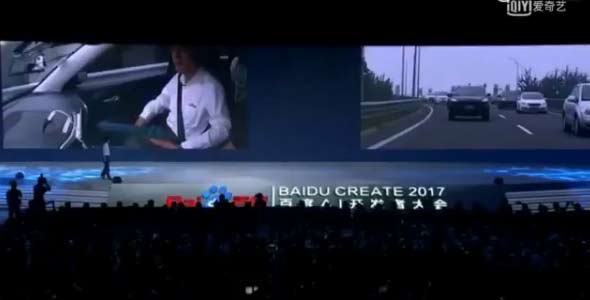


(file photo)
Several days ago, footage showing Baidu CEO Li Yanhong (Robin Li) live streaming himself in a Baidu self-driving car on Beijing's Fifth Ring Road went viral online. Beijing traffic police said they support technological innovation in driverless vehicles, but will investigate possible violations of existing traffic laws.
On July 11, Li responded to the incident in a speech on Artificial Intelligence at Shanxi University, saying that "self-driving cars will be safer than human drivers in the future."
According to Li, about 500 people in China die in traffic accidents every day, and such tragedies can be prevented with the adaption of self-driving cars. "When self-driving cars become common, lives will be saved. It's of great economic and social significance," he said.
Elon Musk, founder and CEO of Tesla, holds the similar view. After a Tesla driver died in a fatal crash while using autopilot mode last year, Musk said that the mass adoption of self-driving vehicles will save 50,000 lives each year, adding that he would not criticize the safety of self-driving vehicles because of a single accident.
Baidu has been engaged in AI for several years and believes the technology will fundamentally change human society. When there was no Internet, the communication between people and things could not be achieved. AI will solve that. "The Internet has improved the efficiency of people-to-people communication; AI will turn the impossible into the possible," said Li.
Last year, Baidu applied for more AI-related patents than the entire country of Japan, Li revealed. At present, AI enterprises are mainly distributed in a few countries, including the US, China, and the UK. Chinese have performed well in AI research and development. "Forty-three percent of AI-related papers in the world are written by Chinese, and the number of their patent applications is growing rapidly."
 Fire brigade in Shanghai holds group wedding
Fire brigade in Shanghai holds group wedding Tourists enjoy ice sculptures in Datan Town, north China
Tourists enjoy ice sculptures in Datan Town, north China Sunset scenery of Dayan Pagoda in Xi'an
Sunset scenery of Dayan Pagoda in Xi'an Tourists have fun at scenic spot in Nanlong Town, NW China
Tourists have fun at scenic spot in Nanlong Town, NW China Harbin attracts tourists by making best use of ice in winter
Harbin attracts tourists by making best use of ice in winter In pics: FIS Alpine Ski Women's World Cup Slalom
In pics: FIS Alpine Ski Women's World Cup Slalom Black-necked cranes rest at reservoir in Lhunzhub County, Lhasa
Black-necked cranes rest at reservoir in Lhunzhub County, Lhasa China's FAST telescope will be available to foreign scientists in April
China's FAST telescope will be available to foreign scientists in April "She power" plays indispensable role in poverty alleviation
"She power" plays indispensable role in poverty alleviation Top 10 world news events of People's Daily in 2020
Top 10 world news events of People's Daily in 2020 Top 10 China news events of People's Daily in 2020
Top 10 China news events of People's Daily in 2020 Top 10 media buzzwords of 2020
Top 10 media buzzwords of 2020 Year-ender:10 major tourism stories of 2020
Year-ender:10 major tourism stories of 2020 No interference in Venezuelan issues
No interference in Venezuelan issues
 Biz prepares for trade spat
Biz prepares for trade spat
 Broadcasting Continent
Broadcasting Continent Australia wins Chinese CEOs as US loses
Australia wins Chinese CEOs as US loses